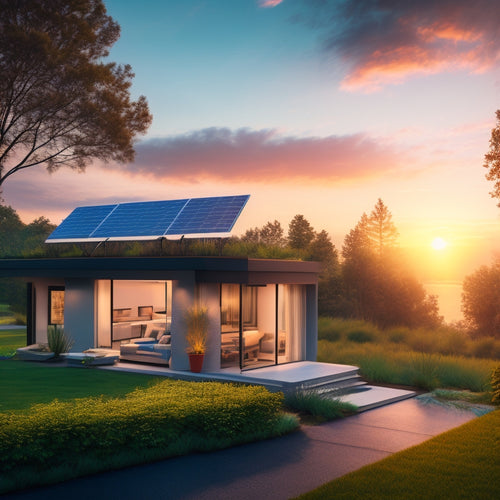
Solar House Battery Backup
Share
You can guarantee a reliable source of power during grid outages and reduce your reliance on non-renewable energy by integrating a solar house battery backup system into your home energy setup, which can store excess solar energy and provide up to 10 hours of backup power. This system enables energy autonomy, promoting a low-carbon footprint and supporting zero-emission targets. By controlling depth of discharge, you can maximize battery lifespan and prevent over-discharge damage. Selection of the right battery capacity is vital, considering factors like performance metrics and energy requirements. As you investigate solar house battery backup further, you'll uncover the complexities of maintenance and cost efficiency that make this solution an attractive choice for homeowners.
The Essentials
- Solar house battery backup systems provide emergency power during grid failures, ensuring critical appliances and lights remain operational.
- These systems integrate battery storage with solar systems, promoting energy autonomy and cost-effectiveness.
- Solar battery backup ensures a seamless transition to backup power during outages, powering essential appliances and HVAC systems.
- The integration of renewable energy minimizes environmental impact and supports zero-emission goals for a sustainable energy future.
- Controlling depth of discharge (DOD) is crucial for maximizing battery lifespan and preventing permanent battery failure.
Reliable Power During Outages
You need a reliable power source to keep your home running during outages, and a solar house battery backup provides just that - an emergency power source that kicks in when the grid goes down.
With a battery backup, you're guaranteed grid independence, ensuring your lights stay on and your critical appliances keep running.
By integrating a battery storage system into your solar setup, you'll access the full potential of renewable energy and create a more sustainable, dependable, and cost-effective power solution solar energy storage solutions.
This means you'll have power when you need it most, even when the rest of the neighborhood is in the dark.
Emergency Power Source
During extended power outages, a solar house battery backup system serves as a reliable emergency power source, providing a seamless shift to backup power. This means you can continue to power essential appliances, lighting, and heating or cooling systems, even when the grid is down.
With a solar house battery backup, you're prepared for emergency situations, ensuring your family's safety and comfort. By storing excess energy generated by your solar panels for use during periods of low production or grid outages, a Home Solar Battery provides a reliable backup power source, reducing your reliance on non-renewable energy and shielding you from fluctuating grid prices. This is especially critical for households with medical equipment or special needs.
When the grid is restored, the solar house battery backup system will automatically switch back to grid power, allowing for efficient power restoration.
With a solar house battery backup, you can rest assured that you're equipped to handle unexpected power outages, giving you peace of mind and a sense of freedom from grid dependence.
Grid Independence Guarantee
A reliable solar house battery backup system guarantees grid independence, enabling homeowners to weather power outages with confidence. When the grid fails, your system takes over, providing a seamless shift to backup power. This means you'll have energy autonomy, even when the utility grid is down.
With a solar house battery backup, you'll avoid the inconvenience of food spoilage and communication disruptions, ensuring home energy storage for your critical appliances. You'll also protect sensitive electronics from damaging power surges and data loss, saving you from costly repair or replacement expenses.
During an outage, your solar house battery backup system will automatically switch to backup mode, supplying power to your home. You'll have the freedom to live life as usual, without relying on the grid.
This level of energy autonomy brings peace of mind, allowing you to focus on what matters most – your family, your work, and your life. With a reliable solar house battery backup system, you're in control, even when the grid isn't.
Low Carbon Footprint
You're likely drawn to a solar house battery backup because you're committed to reducing your reliance on fossil fuels and decreasing your carbon footprint.
By integrating a renewable energy source like solar power into your energy system, you're taking a significant step towards minimizing your impact on the environment.
With the cost of solar battery systems decreasing, including the Tesla Powerwall and LG Chem Resu, it's becoming more accessible to homeowners.
Additionally, energy storage systems like Sonnen eco can provide efficient backup power.
With a zero-emission goal in mind, a solar house battery backup can help you achieve a cleaner, more sustainable energy future.
Renewable Energy Source
Utilizing renewable energy sources is essential for reducing our reliance on fossil fuels and mitigating climate change.
As you shift to a solar house battery backup system, you'll be leveraging the power of sustainable living. Solar panel integration with energy storage technology enables you to store excess energy generated during the day for use during the night or on cloudy days. This integration also provides a backup power source during grid outages, giving you energy independence benefits.
You can take advantage of renewable energy incentives offered by the government to offset the initial investment costs. With advancements in battery efficiency, you can store more energy and reduce your reliance on the grid.
Smart home technology integration allows you to monitor and control your energy usage, optimizing your energy consumption. An environmental impact assessment will also reveal the positive effects of switching to renewable energy.
As you join the growing trend of solar energy adoption, you'll be contributing to a cleaner, more sustainable future. With the pace of innovation in future energy solutions, you can expect even more efficient and cost-effective options to emerge.
Zero Emission Goal
Sustainability's clarion call echoes loudly in today's eco-conscious environment, and adopting a solar house battery backup system is a vital step towards achieving a zero-emission goal. By integrating this system into your home, you're not only reducing your reliance on fossil fuels but also minimizing your carbon footprint. This shift towards sustainable practices is essential in combating climate change and ensuring a healthier planet for future generations.
| Energy Source | Emission Level | Environmental Impact |
|---|---|---|
| Fossil Fuels | High | Significant contribution to climate change |
| Solar Power | Zero | Zero emissions, renewable energy source |
| Grid Electricity | Medium | Varies depending on energy mix |
| Solar House Battery Backup | Near Zero | Maximizes solar power usage, minimizes grid reliance |
Depth of Discharge Control
When you're designing a solar house battery backup system, you'll want to guarantee you're controlling the depth of discharge to prevent over-discharge damage and maximize your battery's lifespan.
This is especially important when using deep cycle batteries that are designed to provide a steady flow of energy over a long period. If you let the battery discharge too deeply, it can reduce its overall capacity and lead to premature failure.
Preventing Over-Discharge Damage
Your solar house battery backup system's longevity hinges on preventing over-discharge damage, a critical aspect of depth of discharge (DOD) control. You must guarantee your battery protection system includes discharge prevention mechanisms to avoid damaging your batteries.
This involves voltage monitoring to prevent deep discharging, which can reduce the lifespan of your batteries. To achieve this, you'll need safety mechanisms in place, such as energy management systems that detect low voltage levels and disconnect the load to prevent further discharge.
This helps maintain your battery health by limiting the number of charge cycles. Additionally, you'll need to implement maintenance strategies, like periodic monitoring and testing, to identify potential issues before they become major problems.
Maximizing Battery Lifespan
Controlling the depth of discharge is crucial to maximizing your solar house battery backup system's lifespan. When you allow your batteries to fully drain on a regular basis, you're reducing their overall lifespan. This is because most battery chemistries have a limited number of charge cycles they can handle before capacity starts to degrade.
To prevent this, you need to implement a depth of discharge (DOD) control strategy. This involves setting a threshold for when your battery backup system should start recharging. For example, you might set the DOD to 50%, meaning the system will recharge when the batteries have drained to 50% capacity. This guarantees you're not over-discharging your batteries, which can cause permanent damage.
A good DOD control system will also take into account charging efficiency. This is because some battery chemistries are more efficient at charging than others. By optimizing charging efficiency, you can reduce wear and tear on your batteries, further extending their lifespan.
Battery Capacity Considerations Matter
You'll need to take into account the battery size options that fit your energy requirements, as undersizing or oversizing can greatly affect your system's performance and cost.
Renewable energy systems, such as grid backup power, require careful planning to guarantee a reliable and efficient solar house battery backup system.
The depth of discharge (DOD) also plays an essential role, as it affects the battery's lifespan and overall efficiency.
Battery Size Options
Determining the ideal battery size for your solar house battery backup system requires careful consideration of multiple factors. You'll need to assess your energy needs, available space, and budget. With various battery types and storage capacities available, it's crucial to evaluate your options carefully.
| Battery Type | Storage Capacity | Suitable For |
|---|---|---|
| Lead-Acid | 2-4 kWh | Small homes, cabins, or sheds |
| Lithium-Ion | 5-10 kWh | Medium-sized homes, apartments, or offices |
| Flow Batteries | 10-20 kWh | Large homes, commercial buildings, or industrial applications |
When selecting a battery size, consider your installation options, energy management requirements, and cost analysis. Performance metrics, such as depth of discharge and round-trip efficiency, will also impact your decision. Researching brand comparisons and user testimonials can provide useful perspectives. Additionally, consider the environmental impact of your chosen battery type and its potential for future upgrades or integration with emerging technologies. By carefully evaluating these factors, you can guarantee your solar house battery backup system meets your energy needs while providing the freedom and independence you desire.
Depth of Discharge
Depth of Discharge (Battery Capacity Considerations Matter)
How much of your battery's capacity can you realistically use before needing to recharge it? This is where depth of discharge (DOD) comes in. DOD refers to the percentage of a battery's capacity that's used before it needs to be recharged. For example, if you have a 10 kWh battery and use 8 kWh before recharging, your DOD is 80%.
A higher DOD might seem appealing, but it can compromise battery efficiency and lifespan. Most solar house battery backups are designed for a DOD of 50% or less to guarantee maximum performance and longevity. This means you'll only be using half of your battery's capacity before recharging, which might seem restrictive, but it's essential for maintaining battery health.
Discharge rates also play a role in determining DOD. Faster discharge rates can reduce a battery's overall capacity, while slower rates can increase it. When selecting a solar house battery backup, consider your energy needs and the DOD that works best for you.
Longer Cycle Life Guaranteed
You'll appreciate the benefits of a longer cycle life in your solar house battery backup, as it directly translates to lower maintenance costs.
With a guaranteed longer cycle life, you'll replace your batteries less frequently, reducing the overall expense of owning a solar-powered home.
This means you'll save money in the long run, making your investment in a solar house battery backup even more worthwhile.
Lower Maintenance Costs
As solar house battery backup systems become an increasingly integral part of modern homes, one essential aspect to evaluate is their maintenance costs. You'll want to compare the cost of maintaining your solar house battery backup system to traditional energy storage solutions.
When you opt for a solar house battery backup system, you'll enjoy lower maintenance costs. This is because these systems require less frequent servicing, reducing your service frequency and repair expenses.
Additionally, many manufacturers offer extended battery warranties, which can last up to 10 years or more, ensuring you're protected from unexpected repair costs.
To further minimize maintenance costs, follow these tips: perform regular performance assessments to identify potential issues early, and consider the environmental impact of your energy storage solution.
Frequently Asked Questions
Can I Use Any Type of Solar Panel With a Battery Backup?
When choosing a solar panel, you'll need to evaluate the type, as not all are compatible with your battery backup system; look for panels with a compatible voltage and wattage rating to guarantee seamless integration.
How Long Does It Take to Fully Charge a Solar House Battery?
When you're relying on renewable energy, you'll want to know that the time it takes to fully charge your battery depends on its capacity and the charging efficiency of your system, which you'll need to calculate to guarantee energy independence.
Can I Add More Batteries to My Existing Solar System?
You're wondering if you can expand your energy independence by adding more batteries to your existing system. Yes, you can, but it's essential to verify the new batteries match your system's compatibility and don't exceed the maximum battery capacity.
Do Solar House Batteries Require Regular Maintenance?
You've heard that batteries need frequent checks to last long, but is that true? Yes, regular maintenance is essential to extend battery lifespan. You'll want to follow maintenance tips like monitoring temperature, watering, and equalizing to keep your batteries running freely and efficiently.
Are Solar House Batteries Compatible With All Electrical Systems?
You'll need to guarantee your battery is compatible with your electrical system to avoid safety risks; incompatible systems can lead to electrical shock, fires, or even grid instability, so it's vital to verify battery compatibility for electrical safety.
Final Thoughts
You're likely thinking, "But won't a solar house battery backup break the bank?" Not necessarily. While the initial investment may seem steep, consider the long-term savings on your electricity bill and the potential to increase your home's value. Furthermore, with a solar house battery backup, you'll enjoy reliable power during outages, a lower carbon footprint, and advanced features like depth of discharge control. By choosing the right battery capacity, you'll guarantee a longer cycle life, making it a worthwhile investment for your wallet and the planet.
Related Posts
-

Sustainable and Eco-Friendly Generators for a Reduced Carbon Footprint
Sustainable and eco-friendly generators are perfect for cutting your carbon footprint and increasing energy efficienc...
-

Why Outdoor Solar Lighting Systems Are Sustainable
Outdoor solar lighting systems are sustainable because they utilize renewable energy, drastically reducing your carbo...
-

The Future of Residential Energy Storage
The future of residential energy storage looks promising and cost-effective for you. With lithium-ion battery prices ...


